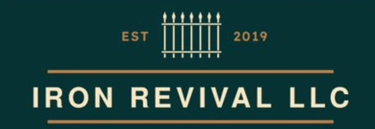Frequently Asked Questions
Q: What does your process look like?
A: I remove rust, flaking paint and imperfections with a cup wirebrush connected to my grinder. For spots I can't reach with that I use different hand tools. Once everything is clean, I treat badly rusted spots with Ospho*, then I use a red iron oxide primer. This primer stops rust and slows down new rust in the future (for a certain amount of time). When the primer is dry I paint the metal in your desired color/finish. I hand paint both and only spray areas I can't reach with the brush. Both products are oil based.
* Ospho is a rust inhibiting treatment which basically turns metal into black iron phosphate, so it gives it extra protection
Q: How does your business stand out ?
A: I am very reliable and punctual. If I tell you I'll be there at a certain time, then I might be there even a few minutes early. I only do one job at a time. I'm an efficient and meticulous worker. I don't waste time at work- you won't see me sitting somewhere or on my phone, I'm extremely detail-oriented and will always give you updates. Battling the rust is most important, but I also want it to look great at the end. So you won't find drips or runners everywhere and I won't mess up the ground with paint.
I know how to do my job and which steps are important. Prep-work is definitely the most important one. I have not had a single project in this area that was done right previously. I have never seen primer under the last coat of paint, SOMETIMES I find it buried under multiple layers. Removing the rust properly and priming is crucial- if you just slap more paint on it, the rust will be back in no time. If you hire someone, make sure they know what they're doing!
Q: What does it mean if the current paint is flaking off the metal?
A: This can have many different reasons. Either the paint is really old, drying times of primer from previous paint job were not long enough, it was too cold when it was painted (metal shrinks in cold temperatures, and expands in warm), the previous coat was still too shiny, so the new paint doesn't have enough grip (either roughing up the surface helps, or priming everything), or the wrong products were used (for example water based on oil based paint). It is important to remove all the flaky paint before it gets repainted, otherwise it will keep flaking off!
Q: What finish do you recommend?
A: I always recommend gloss. It definitely holds up the best, compared to flat or even satin which will fade and 'look old' faster. As for the color, black is the best in my opinion, just because it holds it's color the longest and new rust is not as visible.
Q: Are you able to fix small holes caused by rust or does it have to get replaced immediately?
A: If the hole is not too big and doesn't affect the structural stability, I can fill the hole with Bondo. This is not a final solution, it just gives you more time. But, if there is a risk the structure could collapse due to heavily rusted parts, it has to get replaced. Unfortunately I don't weld, but I can restore everything else and a welder can come later to replace these parts.
Q: After you have done your job, how long will the metal be good for?
A: There is no answer to this question unfortunately. It always depends on the condition (if it was very rusted before, new rust will come back faster), the weather conditions (how much it rains/snows), where the metal structure is located (does is get a rained on a lot, does it get enough sun to dry off quickly, is it near by water etc.) The salty air in this area also has a big, and unfortunately, negative impact on new rust.
Q: How can I maintain my metal structures after you have done your job?
A: Once I'm done with my work and you want to save money in the long run, get a little wirebrush or even sandpaper (80-120 grit), sprayprimer and spraypaint (this is just more convenient for you, of course you can also get buckets). When you see new rust building up, remove it with the wirebrush/sandpaper and prime and paint it. If you keep up with it, it will save you a lot of money!
Q: Does your quote also include material costs?
A: Yes! My quotes include both, material and labor.
